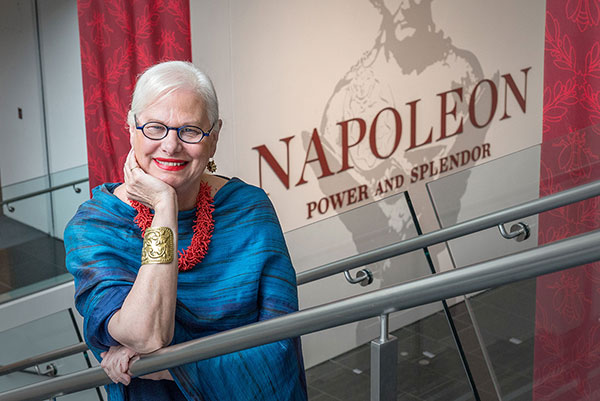
Terry Melville standing at the entrance to the Napoleon exhibition
The concept of self-branding was revolutionary during the 19th century when Napoleon Bonaparte and his household worked diligently to craft his image as a war hero and later, as emperor of France. But today, one needs only to turn on the television or scroll though social media to see how self-branding has permeated our culture.
On July 20, Terry Melville, founder of The Betty Creative Awards and former vice president/fashion director for Macy’s New York, will visit the Virginia Museum of Fine Arts with New York-based stylist, fashion editor and creative director Freddie Leiba for a conversation on “Image Makers: Masters of Self Branding and Their Impact on Culture” in the Leslie Cheek Theater at 6:30 p.m. Tickets are $8. The duo will discuss how celebrities such as Beyonce, Oprah, Ralph Lauren and others utilize advertising, social media and the press to craft their public personas.
With decades of experience in the retail, fashion and entertainment worlds, Melville has seen firsthand how image is everything. We recently spoke with her about the importance of creating a personal brand.
Q: What was your first experience with self-branding?
A: Back when I was starting my career at Macy’s, there wasn’t the buzzword of ‘branding.’ At the time, Macy’s wanted to change their image and be the most entertaining department store in the world. I became a fashion director and traveled around the world. I became a spokesperson for Macy’s and was unconsciously branding the store as we were changing who we were to become young, fashion-forward trend-setters.
I was being interviewed all over the world — I was in magazines, books, newspapers, on TV. At one point I was told that they wanted to cut back on my publicity because I was becoming more important than the store. I was so young I didn’t realize that was happening, but I had created a personal brand.
Q: Describe your brand at that time?
A: What I was doing was buying antique clothing and mixing them up in new and different ways. I got such an incredible reaction. I loved clothes — my body was my canvas. From the end of the 1970s to the beginning of 1990s in New York City was one of the best times for creativity. Macy’s and Bloomingdales were in a war to be the most exciting store. It was the time of Keith Haring and Madonna. Andy Warhol would come into the store.
Q: How does social media affect personal branding?
A: When you think about it we are living in two worlds right now: the real world and the virtual world. I think it’s really interesting to see the two worlds. Someone can have a persona in real life and a different online persona.
I have been hesitant to use social media, but while working on this branding talk, I have jumped into social media, especially Instagram. I have to confess: I am a newbie and I love it! It would be really interesting to imagine how Napoleon would use Instagram.
Q: What advice would you give to someone trying to create their personal brand?
A: For a lot of people it’s a numbers game: how many people are following me? But if someone really does want to make an impact and become a master of self-branding, there’s a lot more to it than how many people are following you. One really needs to be authentic.
I think you have to know yourself, know who you are, and know your vision. Know what makes you unique. If you are going to be in technical terms, ‘followed,’ if you want to be a leader, there has got to be a reason for people to follow you.
Just working on this project has really made me think about how I’m going to rebrand myself. . . . As society changes, we have to be, on some level, always reinventing ourselves true to our brand.
Q: Who would you consider to be a modern-day master of self-branding?
A: Ralph Lauren is one of the top masters. Ralph has been in the business for 50 years and his brand still has the same visual image it did in the beginning, but he has grown and refined. He was the leader of lifestyle branding in fashion. . . . He also lives the brand.
What makes someone a master is their longevity. When you think about Napoleon, if you show a painting of him with his hat on and his hand in his [vest], everyone around the world knows that iconic pose.